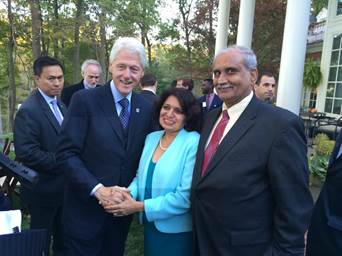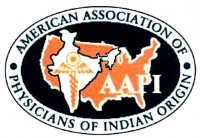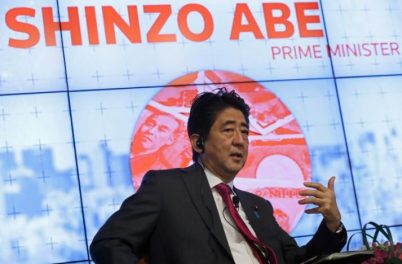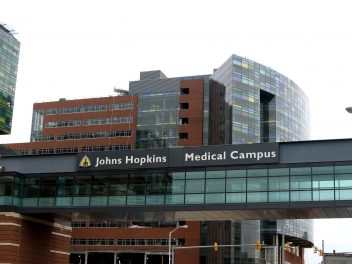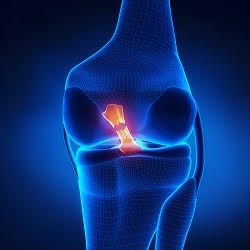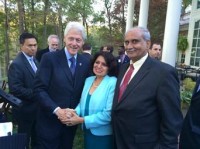 NEW YORK, November 16, 2015 – Members of the American Association of Physicians of Indian Origin (AAPI) recently met here with Bill Clinton, former President of the United States and head of the Clinton Foundation, to discuss ways on how the two organizations can work together to find solutions to a variety of pressing health problems in India. The meeting was held as part of preparations for the upcoming AAPI convention in New York in June, 2016. “President Clinton expressed keen interest in AAPI’s anti-obesity campaign and was appreciative of our healthcare initiatives and for our ongoing support and collaboration,” Dr. Seema Jain, president of AAPI, said after the meeting.
NEW YORK, November 16, 2015 – Members of the American Association of Physicians of Indian Origin (AAPI) recently met here with Bill Clinton, former President of the United States and head of the Clinton Foundation, to discuss ways on how the two organizations can work together to find solutions to a variety of pressing health problems in India. The meeting was held as part of preparations for the upcoming AAPI convention in New York in June, 2016. “President Clinton expressed keen interest in AAPI’s anti-obesity campaign and was appreciative of our healthcare initiatives and for our ongoing support and collaboration,” Dr. Seema Jain, president of AAPI, said after the meeting.
Some of the major health problems that people in India face are: acquired immune deficiency syndrome (AIDS), cardiovascular disease, diabetes, head injury and trauma from road accidents, hepatitis, malaria, mental health issues including depression, and tuberculosis or TB.
Access to diagnostics and critical medicines is often limited in resource-poor settings in India, resulting in dire consequences for vulnerable (poor and inaccessible) sectors of the country’s billion-plus people.
India has a high incidence of road accidents and hepatitis disease. During the last Global Health Summit held in Mumbai early this year, Amitabh Bachchan, a popular Indian actor, pledged to lead a campaign for safety that was initiated by AAPI. This campaign involves educating the public on taking measures individually and collectively, to prevent road accidents and to take precautions against contracting hepatitis.
“I pledge my support for these campaigns and commit myself towards the achievement of AAPI’s worthy goals. I am here with you for these campaigns and in any other campaign you might undertake and if my face and voice can be instrumental in propagating these efforts, I would gladly lend the same,” Bachchan had said. He expressed his wholehearted support for AAPI’s campaign to eradicate hepatitis and tp create awareness about head injury and trauma.
India also bears the highest burden of tuberculosis (TB) in the world, according to World Health Organization statistics. India has 2.1 million cases: over 23 percent of the world’s total of 9 million cases. The WHO estimates that about 40 percent of the Indian population is infected with TB bacteria, but in most of those people, the infections are latent.
On the problem of hepatitis C, many people do not show symptoms and do not know they are infected with it. They live for decades without feeling sick. When symptoms do appear, they often are a sign of advanced liver disease, say experts.
Road traffic accidents kill more than 12 million people and injure over 500 million people worldwide yearly. Everyday about 6,600 deaths and 3,300 serious injuries occur due to such accidents, statistics show. The global annual cost of road accidents is about $230 billion, according to WHO estimates.
India has the world’s worst record of road safety. The country accounts for about 10 percent of road accident fatalities worldwide, according to the Road Traffic Education Institute of New Delhi. And of the estimated 1.4 million serious road accidents and collisions occurring annually in India, only about 400,000 or less than 30 percent are recorded.
The Clinton Foundation has a separate but affiliated entity called Clinton Health Access Initiative or CHAI, that works to strengthen in-country health systems and improve global markets for medicines and diagnostics, ensuring that lifesaving treatments and care can reach the people who need them the most. CHAI’s goal is to transform these systems and ensure they develop into self-sustaining methods of providing low-cost, high-quality care.
A group of AAPI members was in India recently to plan the events and to work with the government of India and its various ministries, and with educational institutions and corporate leaders to have a productive and successful Global Health Summit in 2016 in Mumbai.
AAPI is the largest ethnic medical organization in the United States and represents the interests of more than 65,000 physicians and nearly 35,000 medical students and residents of Indian heritage. Part of its mission is to enable Indian American physicians to excel in patient care, teaching and research, and to pursue their aspirations in professional and community affairs. It is an umbrella organization with nearly 130 specialty societies and alumni organizations.
The president of AAPI Dr. Seema Jain urges all members, friends and colleagues to join the effort towards making quality healthcare affordable and accessible to all people of India. For additional information on AAPI and for details on its Global Healthcare Summit in Mumbai next year, visit these two websites: www.aapiusa.org and www.aapighsindia.org.

